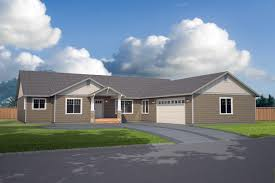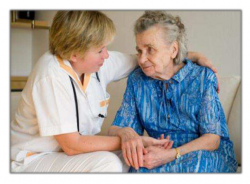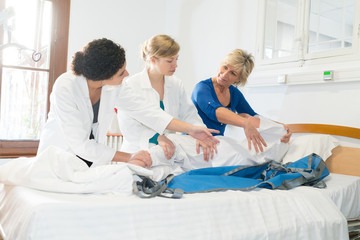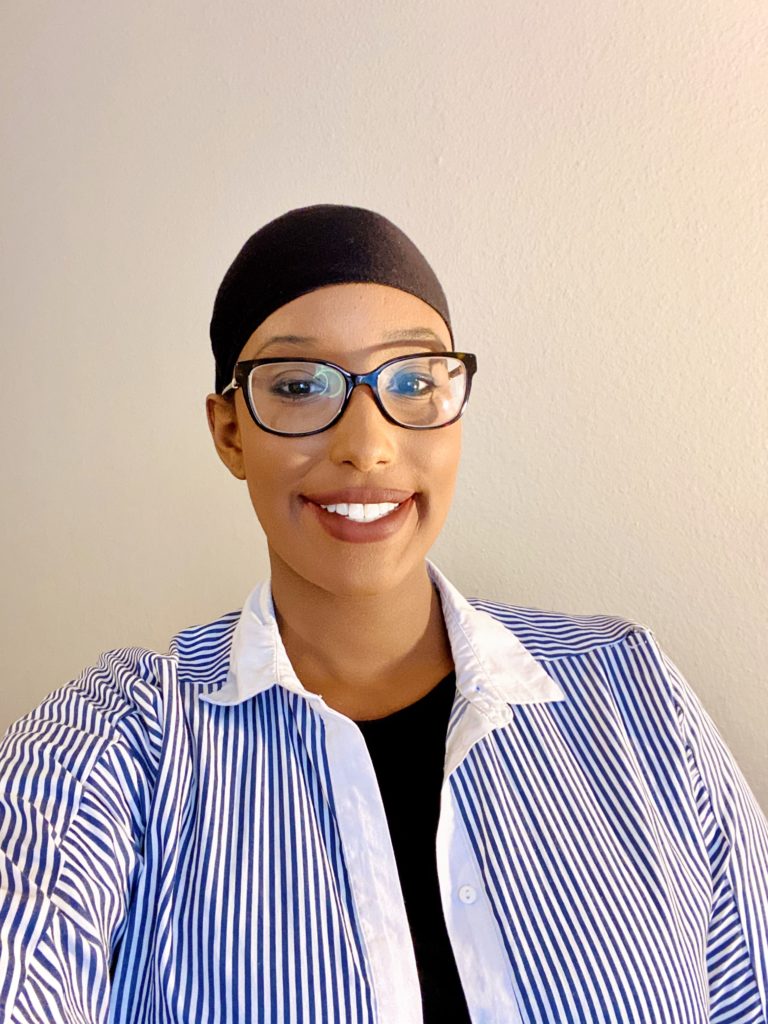Starting an Adult Family Home

“What You Need to Understand”
…Before Becoming a Licensed Adult Family Home Provider
This document contains information intended to help you decide if you want to become a licensed adult family home provider. www.washingtoncareacademy.com provides the complete DSHS approved 75 Hour Home Care Aide Training online. For more information, call 206-306-6588.
Prospective Provider Information
To be an adult family home provider you will be required to care for the most vulnerable members of our society, including persons with challenging behaviors, physical and developmental disabilities, mental illness and the elderly. If you become licensed, you assume a serious responsibility that will have a large impact on you and your family members’ lives.
Adult family homes are heavily regulated. If you become licensed, you will have to meet all of the many licensing requirements. In addition, you will have to provide the care and services that your residents need day and night.
As an adult family home provider, you will find out that, while it can be a rewarding experience, it is also very tiring and stressful to work and be available to residents day and night. As a result, you may decide that you need to hire staff to be awake and available to care for residents at all times.
We know that a number of providers close their adult family homes after only one or two years. This is usually because they did not realize how difficult it would be to share their home with others, how hard the work would be, or how hard it may be to attract residents and operate a business. When a home closes, this negatively impacts residents and their families, as well as providers and their families.
Before you decide to apply to become an adult family home provider, you should consider why you want to become a licensed provider and how you will maintain your adult family home business over time. The self assessment at the end of this guide, along with the other information, may help you decide whether or not you want to go forward with the process to apply to become a licensed adult family home provider.
AFH Definition
What is an Adult Family Home (AFH)?
- An AFH is a residential home licensed to care for two to six adults not related by blood or marriage to the person or persons providing the services.
- The AFH provides room and meals, laundry, supervision, assistance with activities of daily living and personal care. Some homes provide nursing or other special care.
- A licensed AFH is generally at a residential home address.
- An adult family home is a single family residence, a duplex unit, or other type of dwelling for one or two families [per IRC #R101]. Each unit must have:
- Separate staffing;
- Separate call systems;
- Separate living quarters;
- Separate addresses;
- Either a fire wall or floor separating the two units; and
- No internal door in common.
What is not an Adult Family Home (AFH)?
- An apartment in an apartment building or condominium cannot be licensed as an AFH because this type of dwelling is for more than two families.
License Needed
When is a license required?
- You have to have an AFH license before you can provide personal care, special care, room and meals for two to six adults, unrelated to you, in your home.
When is a license not required?
An AFH license is not required:
- To provide care for your own relatives in your home;
- To provide care for one person – unrelated to you – in your home;
- To take care of a relative (such as your mother) and one other person not related to you in your home; or
- If you are providing only room and meals in exchange for rent.
Management Responsibilities
What are some management responsibilities for operating an adult family home?
The following is a partial list of some things the provider must do.
- Know and comply with all AFH applicable laws and rules;
- Meet the assessed care needs and preferences for each resident which may include, but is not limited to:
- Assisting with personal hygiene, dressing, bathing, toileting, body care, walking and moving from one spot to another,
- Providing nutritious meals,
- Offering activities other than television,
- Providing medication assistance or administration, and
- Providing supervision to residents with challenging behaviors or at risk of falls;
- Be responsible for the care and services provided to residents 24 hours a day whether the provider is on site or not;
- Screen and hire responsible, dependable and qualified staff members;
- Ensure that staffing is adequate to meet all resident needs at all times (24 hours a day, seven days a week);
- Provide staff orientation and ongoing staff support and training;
- Maintain adult family home records such as individual resident records, staffing records, accounting, income tax and payroll records; and
- Ensure that each resident is protected from
- abandonment,
- verbal, sexual, physical, and mental abuse,
- exploitation and financial exploitation,
- neglect, and
- involuntary seclusion.
Skills Needed
What are the skills necessary for operating an adult family home?
The provider must:
- Have the character, competence and suitability to operate an AFH;
- Have the ability to read, understand and meet all laws and rules related to AFHs;
- Protect resident rights first over the needs of yourself and your family; and
- Be able to communicate in the English language and ensure that there is staff on-site at all times who are capable of understanding and speaking English well enough to be able to respond appropriately in case of an emergency and implement resident care plans.
Costs
What are the costs associated with obtaining an adult family home license?
A non-refundable $2,750 license and processing fee must be turned in with the license application. The following costs vary by instructor, county, location, fees and codes.
- 48-hour AFH Administrator training provided by community colleges (a list of community colleges is available on the department’s website at https://fortress.wa.gov/dshs/adsaapps/Professional/training/training.aspx)
- First Aid and CPR training for applicants and all staff;
- Tuberculosis (TB) tests for applicants and staff;
- 75 hours of basic/long-term care worker training;
- Home Care Aide Certification Testing and Certification by DOH
- Specialty training if you plan to take residents with dementia, developmental disabilities, or mental illness;
- Building inspection by local building inspectors; and
- Structural changes to your home that may be needed to meet state or local building codes or safety issues.
Orientation Class
What is required before I can apply to be an adult family home provider?
- You must attend a Prospective Provider Orientation class before applying for an AFH license, unless you are currently licensed, or have been licensed within the past year.
- This one-day class is held at six community colleges across the state; cost is $29.
- Find a location near you and register online at https://www.dshs.wa.gov/altsa/residential-care-services/afh-line-orientation-class-registration by selecting the link in the right hand column that corresponds with the site where you are interested in attending class.
Application Requirements
What are some of the application requirements that I must meet to be licensed as an adult family home provider?
- $2,750 non-refundable fee must be turned in with the license application;
- For a change of ownership (CHOW) for a currently licensed AFH, submit a written letter from the current licensee saying that they are willing to give up their license when and if your license is approved;
- Copy of your AFH Orientation Certificate taken within the last 12 months;
- Copy of Washington State Business License Number showing the Unified Business Identifier or UBI;
- Copy of document issued by the Internal Revenue Service (IRS) verifying the Employer Identification Number or EIN (Federal Tax ID Number);
- Copies of documents showing that the applicant provider, entity representative, and resident manager meet the minimum qualifications for licensure including: educational requirements, CPR certificate, first-aid card, TB screening test, and long-term care worker training and Home Care Aide Certificate;
- Meet the minimum education requirements that include a High School Diploma or GED, or any English-translated government document listed in WAC 388-76-10130;
- Completed Caregiving Experience Attestation Form verifying (proving) that you successfully completed 1000 hours of direct caregiving experience to a non-family member in the previous 60 months. This experience must be obtained after you were 18 years of age, and is only applicable if care was to vulnerable adults in a licensed or contracted setting.
- Certification for completing 48-hour Administrator training before applying for an AFH license;
- Copies of specialty training documents if you intend to care for residents with dementia, developmental disabilities, or mental illness;
- Completed Background Inquiry Authorization Forms for all providers, resident care managers, and all members of the household that are eleven years of age or older and others who will have unsupervised access to your residents;
- Copy of the completed AFH Building Inspection indicating “Passed” with the adult family home floor plan and printed directions to the AFH;
- A copy of your AFH admission agreement or private pay and Medicaid-eligible residents;
- A copy of the disaster plan; including the applicant’s or entity representative’s name and the name of the proposed adult family home;
- A copy of your nurse delegation certificate if you plan to perform delegated nursing tasks;
- Be 21 years of age or older and be able to understand and speak English; and
- A completed application and checklist – the department will not process your application if it is not complete.
Education Alternatives
If I do not meet the minimum education requirements, are there other alternatives?
See WAC 388-76-10130. There are no exceptions to these requirements.
- Successful completion of government-approved public or private school education in a foreign country that includes an annual average of one thousand hours of instruction over twelve years or no less than twelve thousand hours of instruction (this is equivalent to grades 1-12 in the United States);
- Graduation from a foreign college, foreign university, or United States community college with a two-year diploma;
- Admission to, or completion of coursework at a foreign or United States university or college for which credit was granted;
- Graduation from a foreign or United States college or university, including award of a Bachelor’s degree;
- Admission to, or completion of postgraduate coursework at, a United States college or university for which credits were awarded; or
- Successful passage of the United States board examination for registered nursing, or any professional medical occupation for which college or university preparation was required. This does not include a certified nursing assistant (CNA).
Will foreign language educational documents need to be translated into English?
- Yes, foreign language educational documents submitted with the AFH application must be translated into English by an approved language translation service that certifies the translation as correct.
Written Verification
What is an attestation?
- An attestation is a legal and formal written statement. If you sign an attestation related to an application, you are saying and confirming that what you are signing is true.
Caregiving Attestation
Who can provide the 1000 hour caregiving notarized attestation or verification for you?
Only the following people may provide attestation or verification for you if they have observed you providing direct care:
- Supervisor;
- Employer;
- Co-worker;
- Client or resident if they are able to read, understand and sign the form in the presence of a notary, and be interviewed by telephone; or
- The resident’s spouse or family member.
Who cannot provide the 1000 hour caregiving attestation for you?
- Anyone related to you by blood or marriage; or
- A Home and Community Services case manager or a Division of Developmental Disabilities case manager.
What is included and verified as true in the notarized “attestation” of caregiving experience?
- The proposed licensee or resident manager has successfully provided 1000 hours of direct care and has caregiving experience.
- The dates of employment and any volunteer work experience as a long-term care worker that occurred after age 18 in a licensed or contracted setting.
- The individual verifies that work experience has occurred in the previous 60 months.
- The individual verifies that they were in a position to personally observe, over time, the applicant’s actual caregiving.
- The accurate address and telephone contact information for the individual completing the form so the attester can be interviewed by the department about the applicant’s caregiving experience.
Building Requirements
What are some of the standards that my home must meet when the licensor makes the initial inspection visit?
You must be able to show or verify the following for your home (this list does not reflect all requirements).
- The home:
- Meets current building code requirements for a single family dwelling (no apartments or condominiums are permitted as an AFH);
- Is clean, sanitary, free of hazards, and safe for residents both inside and out;
- Has secure handrails at all stairs or step/s in and out of the home;
- Has the required approved 2A:10B-C (5#) rated fire extinguishers on each floor of the home;
- Has working smoke detectors on each floor, in hallways, in each resident bedroom, and in close proximity to the provider/staff bedroom;
- Has windows that open easily and have intact screens on windows that can be easily removed in an emergency;
- Has first aid supplies with a first aid manual;
- Has emergency water and food supplies for a minimum of 3days;
- Has all firearms stored in secure/locked storage areas;
- Has a place to lock up medications;
- Has cleaning supplies and other toxic substances out of the reach of residents;
- Has water, well water and private septic systems that are adequate in size and approved (when applicable);
- Has a written and workable disaster plan; and
- Has record keeping processes developed that meet WAC 388-76-10315 requirements.
- Bedroom requirements:
- There must be no more than two residents per room;
- A single room must have a minimum of 80 square feet of usable floor space, not including closet space and door swings;
- A double room must have a minimum of 120 square feet of usable floor space, not including closet space and door swings;
- Doors, including in the bedroom closet, must be openable from the inside and outside;
- There must be enough lighting in the room for residents to do what they want and for staff to do what they need; and
- There must be enough storage space in each bedroom to meet the needs of the residents.
- Bathroom requirements:
- Residents must be able to get to toilets and bath/shower facilities easily;
- There must be one toilet for every five people in the house;
- The tub and shower must have grab bars and non-skid surfaces;
- The hot water temperature at fixtures accessible to residents must not exceed 120 degrees F.
Self Assessment for Potential Adult Family Home Providers
The following assessment was primarily developed by a group of adult family home providers with many years experience in running adult family homes. It is the intent of the assessment to give you as clear a picture as possible of the considerable demands of running an adult family home.
Answer yes, no, or sometimes, to the following questions that best describes your response to each statement.
- I am patient with other people’s mistakes.
- I can be alert and calm and awake in the middle of the night, even after a long day.
- I can take verbal abuse and still forgive. I do not hold a grudge.
- I am comfortable asking others for help.
- I can place the needs of others ahead of my own wants.
- I am comfortable taking care of residents of the opposite and same sex.
- I have experience and am comfortable taking care of people who are elderly, who have mental illness or developmental disabilities who are not related to me.
- I deal with emergencies without panic.
- When planning schedules, I can be thoughtful of the needs of staff, residents, and residents’ families.
- I am aware and prepared to give up most of my privacy because I will be sharing my home with residents.
- Confrontation with staff and resident’s families does not intimidate me.
- I follow established procedures and do not cut corners.
- I can keep abreast of the regulations and laws that govern adult family homes.
- I am tolerant of other cultures and points of view.
- I respect other’s rights, privileges, and privacy and strive never to control or manipulate others.
- I save money for a crisis and routinely plan ahead.
- The financial risks of owning a business or incurring debt do not frighten me.
- I promptly pay my bills.
- I speak English clearly and am easily understood.
- I am in excellent health and have a lot of energy.
- I am organized and efficient.
- I am able to follow the instructions of doctors and nurses who give me care directions for residents in my home.
- I can cope well when cherished residents may pass on. I am able to comfort the dying and relatives of those who are dying.
- I am prepared financially and emotionally for the length of time it may take to get licensed.
- I am able to take and act on constructive criticism regarding areas of my work needing improvement.
If you answered yes to 18 or more of 25 questions, you may understand the nature of the adult family home business.
Before making the decision to become licensed as an adult family home, talk to other adult family home providers and ask to spend time in their homes. Ask lots of questions before committing to opening up your own adult family home.
More Information
For additional information about requirements to operate a licensed adult family home, you may visit the website: https://www.dshs.wa.gov/altsa/residential-care-services/information-adult-family-home-providers







Responses